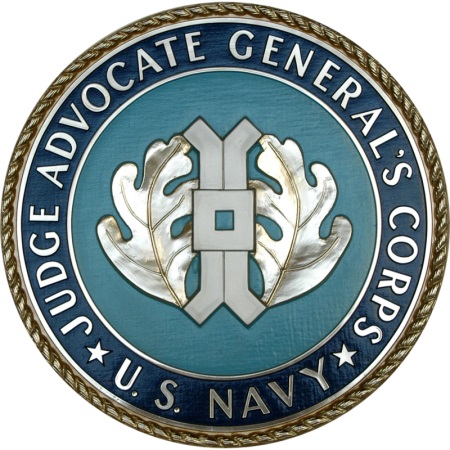
Today’s article covers two more career fields in the military, musicians and legal service providers. Both professions help keep the non-front line machinery of the military operational. Each have been featured in television shows a certain amount. Remember that TV show from a few years back called JAG (Judge Advocate General)? The leading character was a fighter pilot and a JAG Officer, and he routinely saved the world from one calamity or another while simultaneously prosecuting terrorists and defending the hapless enlisted Sailor. Being a JAG officer is just like that, isn’t it? Well, not exactly.
Paralegal/JAG (Army 27x/USMC 44xx/USN 250x or LN/USAF 5J0X1)
JAG officers are bar certified lawyers, and their positions are as varied as you would find in civilian life. JAG Officers can be assigned as prosecutors, defense lawyers, family lawyers (preparing wills, Powers of Attorney, etc.), and contract lawyers. Their duties can change from one assignment to the next. In the upper ranks, JAG Officers can be assigned as an advisor to combatant commanders to provide expertise on Rules of Engagement and Laws of War. They can also be assigned to be Courts Martial Judges.
The Uniform Code of Military Justice (UCMJ) is a set of rules and laws for military members, and it differs vastly from civilian law. Because of that, JAG Officers attend specialized classes on the UCMJ after they are accessed into their branch. Because of the breadth of experience gained as a JAG Officer, employment after separation should come easily, despite the current downturn in the legal market.
Paralegal specialists, the enlisted members that work in JAG offices, also perform important functions. They research and assist in matters concerning criminal law, civil law, contract law, and fiscal law. They assist in the preparation of wills and Powers of Attorney. They also prepare forms and reports, review completed work for errors, and keep correspondence and other files in order.
(Scroll down to read more.)
Advertisement (Marine Corps Boot Camp Film Series)
For more information, visit www.DarkDawnMovie.com.
Formal training to become a military paralegal lasts from 7-10 weeks, followed by a period of on the job training. The training covers such things as legal terminology, judicial processes, preparing legal documents, and more in depth instruction on the UCMJ than is received in recruit training.
Qualities such as organizational and communications skills, research and writing skills, and working well under pressure are very helpful to personnel assigned as paralegals. Upon separation from the military, work as a legal secretary, paralegal, or court clerk can be found fairly easily.
Musicians (USN 643x or MU/Army 42x/USMC 55xx/USAF 3Nxxx)
Military bands, those highly skilled ensembles that can perform with such beauty that hardened troops can be moved to tears, have been a part of military life since time immemorial. Drummers and buglers were used to send signals to the front line before the radio was invented. Today’s full bands deploy and sometimes augment security forces on the larger combat bases. They contribute to not only unit morale, but also to the accomplishment of the mission.
Here’s a little tidbit from the history books: In the Viet Nam War in 1967-68, there was one occasion when the 1st Infantry Division was faced with the daunting challenge of gaining control of an important stretch of road that was controlled by the North Vietnamese Army (NVA). After careful consideration about how to handle the situation, the Division Commander Major General John Hay ordered the 1st Infantry Division band to form up on the road and march one mile down the road and back while playing “Colonel Bogey March”. It is reported that because of the confusion among NVA troops at hearing a band playing, they simply abandoned the area, and the road was taken by the Americans without a single shot being fired. That would be a cool story to tell the grandkids, huh?
The musician Military Occupational Specialties (MOS’) in the military are unique, as they require auditions as part of the enlistment process. By all accounts, these auditions are very tough, and only the most highly skilled applicants are accepted. Schooling for the musician jobs is between 10 and 21 weeks, depending on the branch of service. However, the Air Force Regional Band members do not attend musical schooling after recruit training, but are provided some musical training while in boot camp.
The duties of the band are pretty much what you would think. Ensemble and small group rehearsals, drill (marching), individual practice, and live performances take up the bulk of time. The individual band members will also have additional duties such as supply, administration, unit finance, publicity, and computer staff, among others. Band members expect, given the nature of the job, to work weekends and holidays in ceremonies and holiday celebrations. Time off is given to make up the time when the unit’s schedule permits. Another duty some bands have is providing security assistance in deployed locations. Direct combat is very unlikely at those times, but is possible.
There are some ensembles (The President’s Own, for example) that are so difficult to qualify for that even musicians with years of experience and training (BA or Masters) have a hard time passing the audition process. Each service has their own top ensemble, where open slots are rare and very difficult to win. Those are the bands that play for official State functions and the like, and are very high visibility. Experience in any military band, though, can pave the way for a career in a Symphony Orchestra, Broadway musical support, even working on soundtracks for movies.
Matt Hutchason joined the Marine Corps in 1988. He held various positions, including Artillery Surveyor, Artillery Fire Direction Controlman, and recruiter. After reaching the rank of Staff Sergeant, he transferred to the Army in 1998 to attend Warrant Officer Candidates Course. He retired in 2009 as a CW3 Blackhawk pilot. He currently lives in Madison, Alabama with his wife and children and works as a Defense Contractor. Click here to contact Matt with questions or comments.







